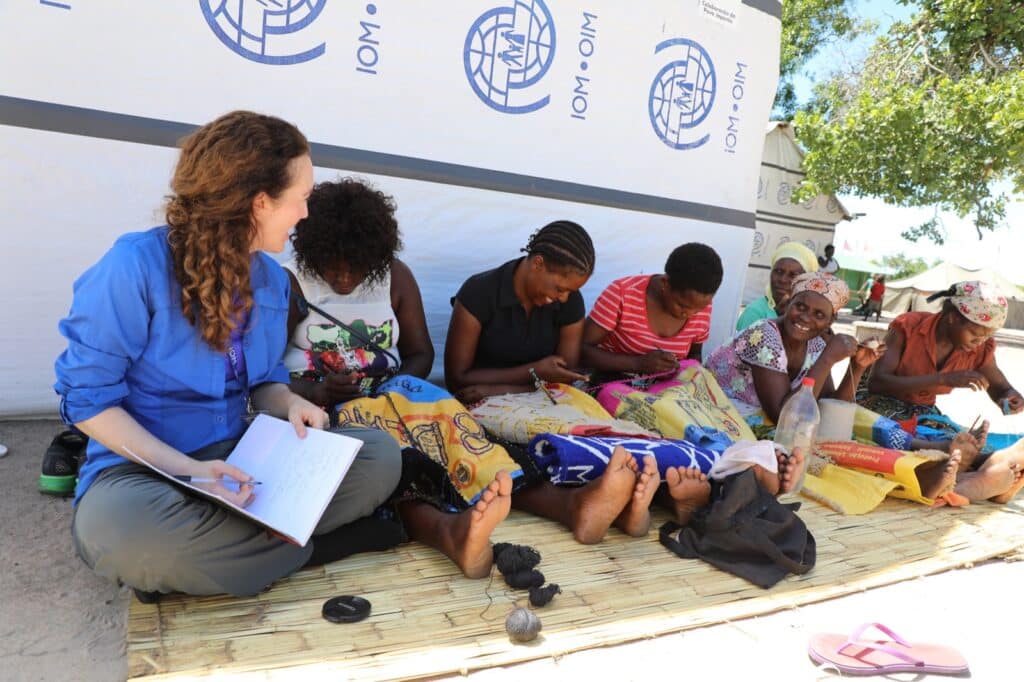
Sandra Black interviews livelihood project participants at displacement site in Central Mozambique.
Anniversaries are a time for both celebration and reflection. World Humanitarian Day 2023 marks 20 years since the attack on UN Headquarters in Baghdad, Iraq. This 19 August, USA for IOM honors those who we work with to meet humanitarian needs globally, #NoMatterWhat.
Echos of the Baghdad bombing persisted when I began working at IOM Iraq in 2014. As a communications officer, my role was to bring attention and expand resources to crisis situations. I share this story, on this day, not only to stand with my fallen colleagues, but also to remind everyone how they can stand with humanitarian workers worldwide.
Recognize the challenges
What does it mean to work in conflict situations, natural disasters and post-conflict zones? I remember from my time in Iraq and Central African Republic.
The humanitarian field experience demands working at full-speed on life-saving tasks, often with intermittent internet and electricity. In most cases as humanitarian workers we have adequate shelter, food, employment, and an organization looking out for us. However, we are faced with daily reminders that those who we support may have lost these entitlements. This work is a labor of love and an exercise in actionable compassion.
When humanitarian organizations say, ‘resources are stretched’, it’s true. We witness those needs in the faces of people in need, who must stand aside humanitarian distribution lines that can only provide for those in greatest need. And even for those who do receive assistance, a displaced grandmother and grandchild whom I met, the resources provided may not even be sufficient for them to set up an adequate shelter. During crisis a full range of assistance is required.
I recall one occasion, at a food distribution for displaced families cornered in a conflict zone, supplies were inadequate. A displaced woman looked at me and said, “If this is the best you can do, we thank you. Is this the best you can do?” Humanitarian resources can rarely provide for all those in need. These situations are painful and uncomfortable for humanitarian workers.
In conflict-affected areas, stories shared by displaced families followed a pattern: hearing explosions, fleeing home, surviving in displacement. As displacement figures climb into the millions, the challenge is to not let our compassion fatigue. How do we uphold compassion? By recognizing individuals and their humanity.
I remember the grateful smiles of displaced individuals who were provided with transportation to reunite with family. And the women in Mozambique, rescued from floods by boat and helicopter, who sang in the bus on the way back home; their joy was contagious.
Well-run humanitarian efforts require investment. Staff training and adequate supplies and preparation are essential.
I remember the Chadian staff member with whom I fled an explosion that targeted the displaced people we were assisting. He was faster than me, but he maintained my pace and held my hand as we ran. Our efforts only succeed when staff are given the support they need, just as he gave me support that day.
I salute my colleagues who are working in crisis zones, including Ukraine, Sudan, and Democratic Republic of the Congo. “I simply couldn’t remain passive… I wanted to join a humanitarian mission and contribute my best to aid Ukraine,” said Mykyta, an IOM Ukraine non-food item team member.
Humanitarian workers are there to serve, despite and because of the risks that are putting other human beings in danger.
This World Humanitarian Day we keenly remember those whose lives were lost in humanitarian service. We honor their memory with determination to provide enhanced support in times of crisis.
I remember the pride of displaced women in Iraq who used donated equipment to set up hair salons to support their families. In visiting refugee camps and displacement sites I consistently encountered nice, normal people who just happened to have been forced to flee their homes. People who aim to improve their situation, and who can rebuild their lives and thrive when provided with adequate assistance.
The theme of World Humanitarian Day 2023 is: ‘No Matter What’. No matter the danger, the hardship, the hostilities… what matters is that we make a difference.
Following several years working in crisis contexts, I am now supporting USA for IOM, continuing to bring attention and resources to IOM’s humanitarian work. I am proud of the spirit of philanthropy in my home country, the United States, and the support offered to those in crisis. Please join humanitarians in standing shoulder to shoulder with the communities we serve #NoMatterWhat.
About the author
Sandra Black has worked for UN Agencies and humanitarian organizations in Iraq, Timor-Leste, Central African Republic, Mozambique, Senegal and Brazil. She is now the Lead Communications Officer with USA for IOM, the non-profit partner in the US of the International Organization for Migration (IOM).

USA for IOM is the International Organization for Migration (IOM)’s nonprofit partner in the United States. | EIN 52-1525929
1752 N St NW Suite #600
Washington, D.C. 20036
For any inquiries please email us at info@usaforiom.org
© 2025 USAforIOM